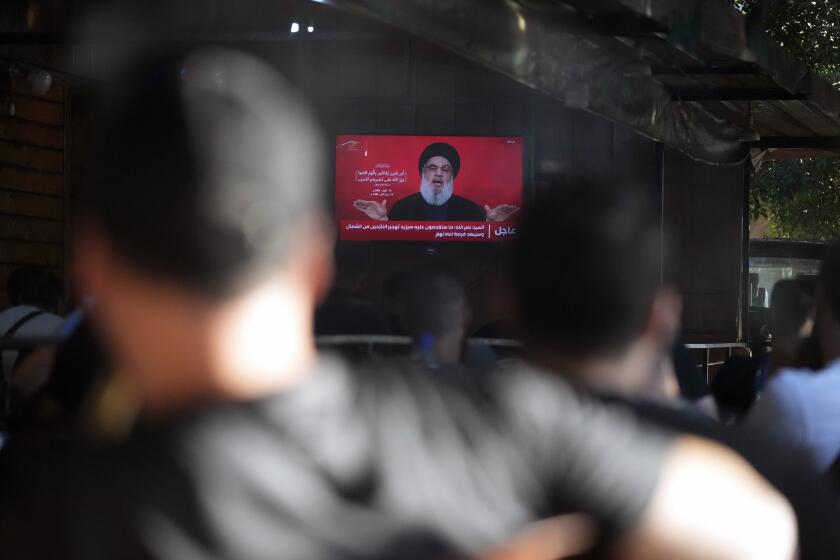Iran’s president calls for consensus, but divisions run deep
TEHRAN — In a speech marking Student Day, Iranian President Hassan Rouhani on Saturday sought “consensus” for his ambitious goals of political reform, economic growth and improved relations with the outside world.
But as he spoke to a gathering at Shahid Beheshti University, the lack of consensus within this divided nation was evident in slogans shouted from the crowd.
“Release political prisoners!” was one cry that periodically erupted from the audience, along with the familiar refrain, “Death to the U.S.A.!”
For the Rouhani administration, which has been in office slightly more than four months, the chants dramatized significant challenges from opposite ends of the political spectrum.
The deep schisms in Iran show the potential for discord facing the president as he endeavors to steer his government “of moderation and hope” toward political transformation, starting with his high-profile and controversial overtures to the West. Recognizing the sensitivities at play, Rouhani has taken pains to call for solidarity and unity amid unease about prospective change and discontent with a listless economy.
“We need tolerance and patience to resolve various issues,” Rouhani told the assembled students, according to a translation from the BBC Monitoring service. “The problems are solvable, but, my dear ones, we should deal with issues rationally.”
The country’s political fissures were plain to see at three different events marking Student Day, traditionally a day of protests held to remember security forces’ killing of three students in 1953 during demonstrations after the U.S.-backed coup that ousted the democratically elected government of Prime Minister Mohammad Mossadegh.
Some view the new president as moving too slowly on a scaled-down reform agenda. Others fear the government is hurtling recklessly toward a perilous makeover.
Rouhani has tried to navigate a cautious middle ground, always seeking the support of Iran’s supreme leader, Ayatollah Ali Khamenei, the ultimate arbiter of state policy. Khamenei has publicly backed the president’s signature initiative — the interim nuclear deal hammered out last month with world powers — despite grumbling from some quarters that Iran benefited too little. The six-month accord puts constraints on Tehran’s nuclear program while offering limited relief from international sanctions that have battered the economy.
Iran’s political divisions include reformers who seek a broad liberalization, including freedom for political prisoners, a relaxation of censorship and a gradual opening with the West. Some attendees at Rouhani’s speech even called out for the release of reformist leader Mir-Hossein Mousavi, who has been under house arrest with his wife, Zahra Rahnavard, since early 2011.
“The government is committed to its promises,” the president said Saturday, apparently referring to campaign vows to free political prisoners. But, Rouhani added, “internal solidarity” was needed to carry out his full agenda.
At another gathering Saturday, at the faculty of literature and sciences at Tehran University, some students chanted passionately in favor of the so-called Green Movement, the reformist trend crushed amid mass protests that followed the disputed 2009 presidential election. Dozens sported green bracelets and shawls, provocative accouterments in a nation where the Green Movement is officially regarded as an act of sedition.
Extremely wary of any move toward political reform are conservatives and hard-liners, including such powerful factions as the Revolutionary Guard Corps, who fear that rapprochement with the West could undermine existing power bases and shake the foundations of the Islamic Republic.
On Saturday, Tehran’s hard-line mayor, Mohammed Baqer Qalibaf, one of the conservative candidates bested by Rouhani in June’s presidential balloting, drew repeated cheers for hailing Iran’s “resistance against the arrogant power,” a reference to the United States. The mayor addressed a gathering organized by student Basiji militiamen, considered ultra-loyal to the Islamic Revolution, in a hall at the Technical College of Tehran University.
During that session, some students called for a public trial and capital punishment for the “ringleaders of sedition,” referring to Mousavi, his wife and his political ally Mehdi Karroubi, who also remains under house arrest. The call prompted some students to walk out.
Also speaking at the hall was another vanquished hard-line presidential candidate, Saeed Jalili, a former top nuclear negotiator who seemed to belittle the current administration’s efforts to build confidence with foreign adversaries.
“The concept of confidence-building favors the West,” Jalili told the students. “They determine what is the suitable level of confidence-building.”
Despite such sentiments, several pro-reform students said they remained optimistic that the president could succeed in steering Iran down a path of gradual internal change and at least limited international reconciliation.
“We had no option but to vote for Rouhani,” said Ali, 23, who, like others interviewed, didn’t want his family name used for privacy reasons. “Now we have no option but to remain hopeful.”
Special correspondent Mostaghim reported from Tehran and Times staff writer McDonnell from Beirut.
More to Read
Sign up for Essential California
The most important California stories and recommendations in your inbox every morning.
You may occasionally receive promotional content from the Los Angeles Times.










